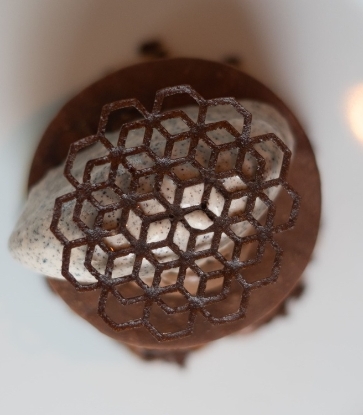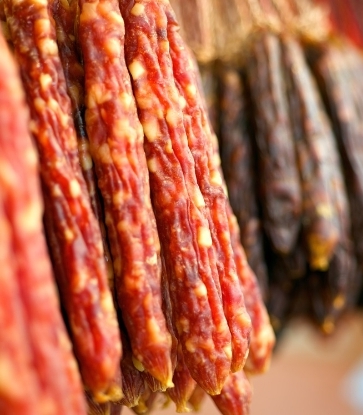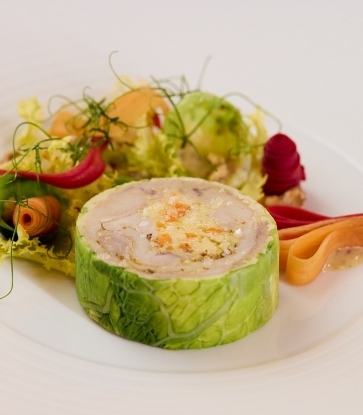The advantages of this type of wine production (which is still fairly niche) are respect for the land, working methods that involve as little intervention as possible in the vineyard and wine cellar, and an absence of chemical additives or artificial manipulation by the wine-grower.
Serbia is at the cutting edge in this sector and is home to some excellent wine-producers who have been using the best expertise and technologies for years to produce impressive, healthy and natural wines.
A perfect example is the Kovačević winery that boasts a family wine-making tradition dating back over a century. In 2001, Miroslav Kovačević took over the company, bringing his grandparents’ oenological expertise into the 21st century. Over the years, investment in new technologies and the purchase of additional land has allowed the company to grow and to develop new projects such as the opening of the Vinska kuća restaurant, a veritable gastronomic oasis that brings together natural wines and excellent cuisine.

“Our aim is to always produce exceptional wines, and that quest requires a combination of knowledge, skill, love and commitment”, says owner Miroslav Kovačević. “The climate, history and fertile soil of Fruška Gora are a blessing for us. The region’s microclimate, heterogenous soil, the influence of the Danube and the echoes of our long history all combine to create an inextricable connection between man and vine. This is who we are, these are our family’s roots, and this is the spirit of our wine”.
“The vine is the beating heart of the wine and it’s part of our family”, Kovačević continues. “We take care of the vine as if it were one of us. With the wine we grow, become more mature and age. We started out with a small family vineyard on the southern slopes of Fruška Gora above Iriga. Over time, our vineyards grew and extended. We planted new vine shoots and bought new land with the aim of increasing our range of wines in order to showcase the different features of our soil and our splendid climate in the wines themselves”.
Today, the Kovačević winery owns more than seventy-five hectares of vineyards in Fruška Gora and a further fifty-five hectares are ready for planting. The company’s flagship grape varieties are Merlot, Cabernet Sauvignon and Pinot Noir for reds and Chardonnay, Sauvignon Blanc and Reno Riesling for whites.
“Everything depends on the grape, the sun, the rain, the soil that has nourished the vine, and the harvest”, explains Miroslav Kovačević. “We wanted to listen to nature and do our part to champion biodiversity. Since 2018, all of our vines have been cultivated organically, without the use of any chemicals at all. If the vine is healthy and is looked after properly, it will be capable of surviving in its natural environment on its own, without the need for chemicals. Our primary aim is to build up a nucleus of self-sufficient vines. We also create a kind of “competition” between the vines and fruit trees (such as cherries and peaches) or rose bushes, so that the grapes are fewer but of a very high quality. In other words, we’re aiming for a transition to biodynamic production so that we have an even stronger connection with nature”.
“Over the last 15 years, there has been a huge increase in the number of people championing natural wines. When I started producing orange wine in Serbia in 2014, practically nobody was doing this. Today, the number of producers increases year on year and we’re happy to have been at the forefront of this movement. As in the past, we still only use wild yeasts (that is, those that come from the grapes on the vine itself), do not use additives and our wines are not filtered or refined. The internal Serbian market is not yet as “mature” as elsewhere, but this is a growing trend which makes us hopeful that we will soon attract more of our compatriots. On the positive side, we can see that in recent years more and more young people are showing a greater curiosity towards organic wines. Generally speaking, young people are more open-minded and aware, and as a result, they fully understand the importance of the connection between man and nature”.
Vinarija Kovačević’s headquarters is in Irig, the old capital of Fruška Gora, in an imposing building that once housed the Wine, Fruit and Vegetable Cooperative founded in 1930. Its interior is subdivided into areas for the delivery and processing of the grapes, the barrel room and storage of reserve wines.
Here, modern technology stands alongside reminders of the past, such as the old photos and portraits that bear witness to the company’s long connection with the land and past wine harvests.
The wines produced by the Kovačević winery represent the best of the climate, terroir and characteristics of each area and include Orpheline (white, red and rosé), Rhine (Riesling), Kovačević (Chardonnay) and Kovačević Edizione S (Aurelius), Kovačević Edizione R (Sauvignon), Kovačević Edizione R (Riesling, stored in traditional qvevri amphorae), and Kovačević Edizione R (Pinot Noir).
“By using amphorae, we are bringing back traditions that are thousands of years old. Through our S and R wines in particular, it’s possible to sense the power of nature and the authentic flavour of the grape which results from vines harvested by hand”.
Kovačević winery’s journey doesn’t stop here,however: “We are planning major investment to encourage wine tourism in our region, which also features a thermal spa within a national park”, concludes owner Miroslav Kovačević. “We’re also working on a new tasting room where we will create unique food and wine combinations, with a particular focus on organic food. Whenever you taste our wines, you’ll sense the soul and heartbeat of our land and you’ll understand the authentic spirit of Fruška Gora”.

Another excellent winery in Serbia is Plavinci, which produces natural wines in unspoilt surroundings along the Danube in Zaklopača, not far from Belgrade. The name Plavinci means “indigo hill” and is said to date back to olden times, when sailors travelling on the Danube between Belgrade and Smederevo caught sight of this hill planted with vineyards shining a brilliant indigo colour in the morning sun, as a result of the blue copper sulphate sprayed on the vines.
Cultivation was then abandoned for over a century, until a small plot of land was replanted with vines in 2008 and then in 2010 with the first organic vines. Gradually, plot by plot, the vineyards became established and the Plavinci winery was born.
The company pays extraordinary attention to each bottle of wine. As a result, each bunch of grapes is harvested by hand, pressed, bottled, and labelled with love, dedication and affection.
“We dedicate more than ten times the amount of time necessary to each bottle”, says founder and owner Branislav Andjelic. “We’re not aiming to conquer the market, but to appeal to those looking for authenticity. Our aim is to bring pleasure to those who appreciate our work and its remarkable results.”
“When I founded my organic vineyard in 2008, I had no particular knowledge”, he says. “I’m an economist and I had no farming experience at all. There were no books or articles in Serbian, universities didn’t teach organic vine growing, and there were no research materials at all. And so, I rolled up my sleeves and started to visit organic, biodynamic and natural wine-producers in Europe and the United States. I read books and scientific articles in English. Today my message is this: if you want to make natural wine, you have to have a better understanding of chemistry, microbiology and technology than traditional wine-producers. If the final result is not good, doesn’t have a pleasant aroma or is defective in any way, then no-one cares whether it’s natural or not. Too many people think that all you have to do is press the grapes, then come back six months later and bottle the wine. If you do this, the end result will be what happens when the grape ferments naturally, namely vinegar. Our approach is very different and starts with an in-depth knowledge of the subject”.

“Interest in natural wines has exploded in the last three or four years”, continues Andjelic. “I remember that in 2014, when I introduced my orange wine Ćilbar to the market, nobody drank it. The colour and aromas were so different from the norm that everyone thought it was a “failed” wine, whereas in fact there was absolutely nothing wrong with it. Until 2000 there were only three wineries in Serbia that had organic certification: now there are twenty currently undergoing conversion and at least six of those will be certified organic in time for this year’s grape harvest. This sector is definitely growing, even though there still remains much to be done, such as creating specific production areas in wineries and special sections on restaurant wine lists”.
This company’s main wines include the red Indigo which is made from the German Regent grape variety and is very rare in Serbia and the Balkans – it produces a wine with a very deep ruby-red colour, with plum and sour cherry aromas and full-bodied tannins. Using grapes which are completely ripe (but not overly so), a short maceration process, and the use of old oak barrels during the ageing process, we produce a refreshing, fruity wine which goes well with pizza or snacks as soon as it’s opened, while if you leave it to breathe for several hours and serve it at room temperature, it provides the perfect pairing for a rare steak or Hungarian goulash.
Another wine well worth trying is Selena, made using Tamjanika grapes (a small-berried Muscat Blanc) and awarded a double gold medal by a jury of five “Masters of Wine”. Tamjanika is the most popular grape variety with wine-makers in Serbia and it was difficult to adapt its basic characteristics. “I fermented the grapes at a higher temperature and left it to macerate for nine days”, explains the owner. “After macerating in the grape skins, the wine is bottled in its unrefined and unfiltered state. In this way, I managed to make a wine with much sharper aromas and a fuller sensation on the palate than usual. If you drink it at room temperature it makes a pleasant aperitif, while when chilled it is perfect for a fine dining restaurant”.
"At the Plavinci winery, nothing is added and nothing is taken away”, emphasises Andjelic. “Balance, a sustainable love for our land, and health are our obsessions. Our wines are also certified vegan. Very few people know that wines are sometimes clarified with eggs, milk, fish bladder, or pork and beef gelatine, all of which can leave residues in the wine. We don’t use them and so our wines are 100% vegan”.
“Young people are our main consumers of natural wines”, he explains. “The ethical aspect is of real interest to them. In addition, as they mainly drink beer, they’re not “impressed” by “famous conventional names and labels”. They are also much more open to new aromas and flavours. I am of a certain age, and I don’t use Instagram or Tik Tok, but there are times when I would like to be more involved in social media so that I could communicate more effectively with this new, highly interesting clientele”.
As we’ve seen, the personal aspect is an essential part of this kind of wine production. “Being an organic wine-producer and a natural oenologist is a constant journey of discovery and revelation”, concludes wine-producer Branislav Andjelic. “I wish that I had started this wonderful journey much sooner, when I was 30 years old. This is an extremely satisfying and rewarding job and I can’t imagine doing anything else for the rest of my life”.
Kovačević and Plavinci are authoritative voices in the production of natural wines in Serbia, a natural wine-producing country that deserves much more attention from wine-enthusiasts. At first easy to ignore, these natural wines are now being revived and are starting to attract greater interest across the country. Thanks to the high quality of the wine produced, they also look set to make a successful appearance on the international stage.














